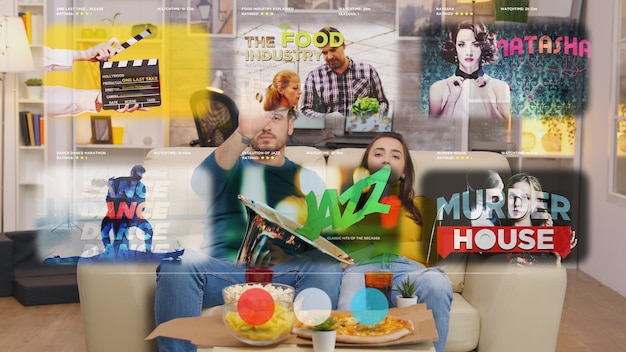Reality TV Revolution: Outrageous Moments & Top Shows

The Reality TV Revolution: The Most Outrageous Moments and Highest-Rated Shows of the Current Season displays a cultural phenomenon that has drastically reshaped entertainment, featuring controversial scenes, fan-favorite series, and high viewership that captivates audiences while sparking conversations on authenticity and impact.
The realm of reality television continues to enthrall and stir controversy, with each season upping the ante in drama, competition, and sheer outrageousness. Reality TV Revolution: The Most Outrageous Moments and Highest-Rated Shows of the Current Season explores the hit shows, the water-cooler moments, and the cultural impact of this ever-evolving genre.
The Enduring Appeal of Reality TV
Reality TV has cemented its place in popular culture. Shows documenting real-life situations, competitions, and social experiments consistently draw in large audiences. But why is this genre so compelling?
One key factor is relatability. Though the situations may be heightened for entertainment value, viewers often see aspects of their own lives and relationships reflected on screen.
Voyeuristic Pleasure
Another appeal lies in the voyeuristic aspect. Reality TV offers a glimpse into the lives of others, satisfying a natural curiosity about how different people live, interact, and handle challenges.
The drama and conflict inherent in many reality shows also provide a form of escapism, allowing viewers to vicariously experience intense emotions and situations without personal risk.
- Relatability: Reflects real-life situations and relationships, allowing viewers to connect.
- Voyeurism: Offers a peek into the lives of others, fueling curiosity.
- Escapism: Provides an escape from daily routines through drama and conflict.
- Social Currency: Creates common ground for conversation and debate.
Ultimately, the appeal of reality TV is multifaceted, blending relatability, voyeurism, and escapism into a form of entertainment that continues to captivate audiences worldwide.
The Highest-Rated Reality Shows of the Year
Several shows have consistently topped viewership charts, proving their staying power and cultural relevance. These shows capture the essence of what makes reality TV so popular: drama, competition, and relatable stories.
Let’s delve into some top performers and what sets them apart.

“American Idol” and “The Voice”
Competition shows like “American Idol” and “The Voice” continue to be ratings juggernauts. Their format of showcasing talent and offering the chance for ordinary people to achieve their dreams resonates with a wide audience.
Both shows also benefit from the star power of their judges, who provide entertainment and mentorship throughout the competition.
“Survivor” and “The Amazing Race”
“Survivor” and “The Amazing Race” stand out for their unique blend of physical and mental challenges. These shows test contestants’ limits and abilities.
The strategic element of “Survivor,” coupled with the global adventures of “The Amazing Race,” keeps viewers engaged and invested in the outcome.
- “American Idol”: Showcases rising talent and offers a shot at stardom.
- “The Voice”: Features celebrity judges mentoring aspiring singers.
- “Survivor”: Tests physical and mental endurance in a strategic game.
- “The Amazing Race”: Sends teams on global adventures with challenging tasks.
From talent competitions to survival challenges, the highest-rated reality shows offer a diverse range of entertainment that appeals to different tastes and interests. Their ability to consistently attract large audiences underscores their enduring popularity.
Most Outrageous Moments That Shocked Us All
Reality TV is no stranger to controversy, and some moments are so shocking they become instant viral sensations. These moments often involve conflicts, unexpected twists, or behavior that pushes the boundaries of what’s considered acceptable.
These outrageous moments become cultural talking points.
On-Screen Altercations
Physical altercations, though rare, are among the most shocking events in reality TV history. When contestants resort to violence, it generates immediate condemnation and intense media scrutiny.
Such incidents often lead to immediate expulsion from the show and can have lasting repercussions for those involved.
Unexpected Betrayals
Shows centered around strategy, have seen contestants betray alliances in shocking ways.
These betrayals can be especially dramatic when they involve close friends or partners, leaving viewers stunned and outraged.

- Physical Altercations: Rare but highly impactful moments that generate controversy.
- Unexpected Betrayals: Strategic moves that shock and anger viewers.
- Controversial Comments: Statements that spark public outrage and debate.
- Twists and Turns: Unpredictable plot twists that change the trajectory of a show.
Outrageous moments are a double-edged sword for reality TV. While they generate buzz and attract viewers, they can also damage the reputation of the show and its participants.
The Role of Social Media in Amplifying Drama
Social media has transformed how viewers engage with reality TV. Platforms like Twitter, Instagram, and TikTok have become virtual water coolers where fans discuss, dissect, and react to every episode.
This heightened engagement amplifies the drama and extends the show’s reach.
Instant Reactions and Viral Moments
Social media allows viewers to share their thoughts and emotions in real-time. Outrageous moments quickly go viral, spreading beyond the show’s core audience.
Memes, GIFs, and short video clips capture the essence of these moments and perpetuate their impact.
Direct Interaction with Cast Members
Cast members can interact directly with viewers through social media, responding to comments, clarifying misunderstandings, and even fueling rivalries. This direct interaction blurs the line between reality and entertainment.
Some cast members use social media to defend their actions or call out other contestants, adding another layer of drama to the show.
- Instant Reactions: Social media allows viewers to instantly share their thoughts on what is happening at that moment.
- Direct Interaction: Cast Members can interact directly with fans online.
- Amplified Reach: Viral moments spread beyond the show’s core audience.
- Second-Screen Experience: Social media enhances the viewing experience with real-time engagement.
Social media has become an essential part of the reality TV ecosystem, amplifying the drama, extending the show’s reach, and transforming how viewers engage with their favorite programs.
Behind the Scenes: How Producers Craft the Narrative
While reality TV is presented as an unscripted look into real lives, producers play a significant role in shaping the narrative. Through strategic editing, carefully chosen storylines, and subtle prompts, producers can influence how events unfold and how contestants are perceived.
Understanding these techniques helps viewers become more discerning consumers of reality TV.
Strategic Editing
Editing is a powerful tool that producers use to create drama. By selectively cutting and splicing footage, they can manipulate the timeline of events. This process can be used to highlight conflicts, create suspense, and portray contestants in a particular light.
Even seemingly innocuous comments taken out of context can have a significant impact on how a contestant is perceived.
Storyline Manipulation
Producers often identify key storylines early on and then work to shape the season’s narrative. This may involve encouraging certain relationships, fanning the flames of existing rivalries, or introducing unexpected twists to keep the audience engaged.
While contestants are free to make their own choices, producers can subtly nudge them in certain directions through carefully crafted challenges and prompts.
- Strategic Editing: Manipulating footage to create drama and shape perceptions.
- Storyline Manipulation: Shaping the season’s narrative through carefully chosen plot points.
- Contestant Prompts: Influencing contestants through strategically placed questions and challenges.
- Confessionals: Using interviews to guide the narrative and reveal inner thoughts.
Producers are skilled storytellers who use a variety of techniques to craft compelling narratives that keep viewers hooked. Understanding these behind-the-scenes tactics can make watching reality TV a more critical and engaging experience.
The Ethical Considerations of Reality TV
Reality TV raises several ethical concerns, including the exploitation of contestants, the perpetuation of harmful stereotypes, and the blurring of lines between reality and fiction. These issues have sparked ongoing debates about the responsibilities of producers, networks, and viewers.
It’s important to consider these ethical implications when engaging with reality TV.
Contestant Well-Being
The pressure and scrutiny of being on reality TV can have a significant impact on contestants’ mental health. Some contestants have reported experiencing anxiety, depression, and even suicidal thoughts after appearing on these shows.
Concerns have been raised about whether producers and networks do enough to protect the well-being of their contestants, both during and after filming.
Stereotypes
Reality TV has been criticized for perpetuating harmful stereotypes based on race, gender, sexual orientation, and other factors. These stereotypes can reinforce negative biases and contribute to discrimination.
Networks and producers have a responsibility to ensure that their shows are not perpetuating harmful stereotypes and that contestants are portrayed fairly.
- Contestant Well-Being: Protection of mental health during and after appearing on a show.
- Perpetuation of Stereotypes: The harm caused by stereotypes about various groups.
- Invasion of Privacy: Shows that cause contestants to have their privacy invaded.
- Authenticity Debate: Whether reality shows are authentic or scripted.
Reality TV has the potential to be both entertaining and thought-provoking, it also raises complex ethical questions that deserve careful consideration. By being mindful of these issues, viewers can engage with reality TV in a responsible and ethical way.
| Key Point | Brief Description |
|---|---|
| 🏆 Top-Rated Shows | “American Idol,” “Survivor,” and “The Voice” lead in viewership. |
| 😲 Outrageous Moments | Altercations and backstabbing are a hallmark. |
| 📱 Social Media Role | Amplifies drama and extends show reach. |
| 🎬 Production’s Narrative | Producers manipulate storylines, edit strategically.. |
FAQ
▼
Reality TV’s popularity stems from relatability, offering a glimpse into diverse lives. The drama and competition offer a form of escapism.
▼
Producers shape narratives through strategic editing and curated storylines. They also influence contestants, by having them do specific challenges.
▼
Social media amplifies drama,. Cast members can directly interact with viewers, and viral moments spread beyond the show’s audience.
▼
Shows can cause stress and scrutiny. There are reports of anxiety, depression, and suicidal thoughts after apearing on these shows. Networks need to do more.
▼
“American Idol,” “The Voice,” “Survivor,” and “The Amazing Race” are consistently highly rated. They offer competition shows and mental physical challenges.
Conclusion
The reality TV revolution continues to capture our attention with outrageous moments and top-rated shows. From strategic editing to the role of social media, understanding the dynamics of this genre offers a more critical and engaging viewing experience. Whether it’s competition, drama, or a glimpse into the lives of others, reality TV has solidified its place to entertain viewers.